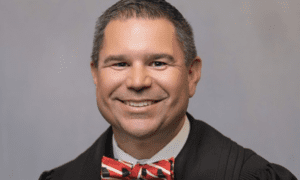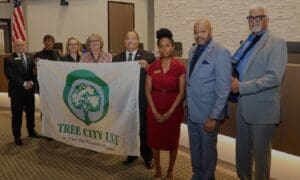Several candidates for the three seats on the Fayette County Commission found themselves on the defensive at the June 19 candidate forum hosted by the Fayette County Local Issues Tea Party.
Post 1 candidate Charles Oddo was asked about “multiple attempts” to annex property his family owns into Fayetteville for “high-density development” and whether development of that property had anything to do with him running for commission.
“The long answer is no,” Oddo said. “Where they get these things from is beyond me.”
Oddo noted that his brother Paul, a city councilman in Fayetteville, had recused himself from the matter and did not even attend a meeting between the potential purchaser of the property and the city.
“It’s not like we’re using the system to get something,” Oddo said. “I’m really here because I love this county. The fact that I have some land, and it’s still there, and it’s not just mine, it’s my brothers’, it’s a wonderful thing. Now some day this county, this land is going to be developed. And we’re all here talking about growth. Are we not going to look at my piece of property because I’m a commissioner? If that was to happen, I would recuse myself.”
Oddo said he would not vote on matters involving any property that he has “any say in running or ownership.”
“Everybody should understand that I am not here to develop any property that I own,” Oddo said. “I am here to serve these people, period.”
Post 1 candidate Robert Horgan responded to a citizen’s question about whether there is a conflict of interest since he as a commissioner votes on the budget for the sheriff’s department, even after his May 2009 arrest for misdemeanor marijuana possession, which he later pled guilty to.
“About four years ago I made a mistake in my life,” Horgan said. “It’s a matter that me and my family have taken care of. I regret that it happened, I’m sorry that it happened, but I think by being on the board of commissioners what I’ve done is proven myself. … As far as the budget of the sheriff’s department it is merely a budget. We provide an amount of money that the sheriff asks for and that is the extent of what I do with the budget. The sheriff is an elected official and he can do whatever he likes to with it.”
Horgan also contended that he had no conflict with the sheriff’s department resulting from his arrest.
Moderator Leslie Edwards suggested it might have been more of a problem had the sheriff’s department not arrested Horgan for the violation, which occurred on Stanley Road outside of the Fayetteville city limits.
Commissioner Lee Hearn answered a question about his failure to explain that Addison Lester was his cousin when Hearn recommended Lester to be appointed to the Fayette County Board of Elections.
Hearn said at that Feb. 24 meeting that he knew Lester from church, but he did not disclose the fact that Lester was a first cousin to his mother until the matter was brought up at a subsequent commission meeting.
“He’s an honorable guy with impeccable integrity,” Hearn said, noting that the other two members of the elections board voted Lester to be the board chairman.
Hearn also said that one of the most important jobs of the elections board is to select poll workers, and Lester has lived here his entire life and knows plenty of good people who can help in that regard.
“Did I make a mistake? Yes,” Hearn said. “I apologize for that mistake. If I had to do it all over again I would have acknowledged that.”
Hearn went on to say that he thinks Lester will do a good job “and I’m not worried about his integrity.”
Moderator Edwards stopped Hearn, saying “the question wasn’t really about his integrity; we weren’t questioning his integrity at all.”
Post 1 candidate Horgan defended the commission not seeking bids for engineering work for the county water system, saying it is more preferable to stay with Mallett Consulting Inc. which designed and built the system.
A different company would not be familiar with the water system and would have to start from scratch, Horgan said, “and I can’t imagine how much money that would cost the taxpayers.”
Horgan noted that much of the water system work is still bid out, but Mallett creates the specifications for those bids and sends the packages out for bid.
Post 1 candidate Oddo said even if he favors doing business with someone, he will still go out and get a bid to make sure the cost being charged is appropriate.
“I don’t see any harm in asking somebody else to do exactly the same thing these folks are doing so that we know the county is getting what we’re paying for,” Oddo said. “… We have to make sure we’re getting the best for the buck. And we can’t be sure if we don’t ask anybody else to bid.”
Several candidates avoided another potential hot-button question: whom they would support to be the new chairman of the commission next year. The five commissioners elect a chair at the beginning of each calendar year.
Post 2 candidate Sheila Huddleston said until she knew who all the board members would be, “I can’t realistically make a good decision or go, ‘I would vote for you’ or ‘I would vote for you.’ I can’t determine that until I see who’s elected.”
Post 3 candidate Randy Ognio said he hadn’t decided who he would support for chairman, because he didn’t have any idea who would be on the commission beyond the two commissioners who are not up for re-election this year. Commissioners Allen McCarty and Steve Brown are the only two locks for being on the commission come Jan. 1; the other three positions will be sorted out by the election.
Post 2 candidate David Barlow said he would support Ognio as being the chairperson, which drew applause from the crowd.
Post 3 candidate Susan Stopford said she too would have to wait and see how the elections turn out before she could make a decision on who she thinks should be chairman.
Candidates were also asked by moderator Edwards: “What would you do to avoid the same disrespect among the commissioners that we often see at the meetings?”
Post 2 candidate Huddleston said in the past that some commissioners have “acted like school kids” and it simply needs to stop. She drew an analogy to raising her son as a single parent.
“You just learn to say no,” Huddleston said. “And you say, we cannot tolerate this behavior anymore. And it’s like until you can play well with others, you don’t need to be here.”
Post 3 candidate Lee Hearn said he thinks it’s “healthy” to have disagreements and “spirited discussions” but it’s also important for commissioners to “remain professional and not get personal about it.”
“We can disagree, and I often disagree with Mr. Brown, but I can do it respectfully and usually when you disagree with somebody, there’s some respect returned.”
Post 3 candidate Stopford said that she agreed disrespect is a problem encountered by the commission and she thinks transparency and the ability to keep an open mind “and listen to their team and look at the county commission as a team.”
The goal, Stopford said, is to keep her values intact but have a spirit of working together with the other commissioners “to get the best solutions for the people of Fayette County.”
Post 2 candidate Barlow said he wanted to point out that Commissioner Hearn was not the “disagreeable” person on the commission. Rather, Barlow pointed the finger at outgoing commission chairman Herb Frady, who declined to run for re-election.
Post 3 candidate Ognio said it’s a matter of leading by example.
“If you go at things with respect, people are going to respect you more,” Ognio said. “And if you’re the one leading, and do that, the rest of the people around you will have the same respect that you give them.”
The candidates also were asked about the top priority facing the county commission in the coming year. Post 1 candidate Robert Horgan said he felt it would be hiring a new county manager upon the retirement of County Manager Jack Krakeel.
“I think that is going to be the critical thing to move us forward, finding the right person for that job,” Krakeel said. “… The budget obviously is very important but to me that is the most important thing right there.”
Post 3 candidate Susan Stopford said she thought the current commissioners would make that decision before the newly elected candidates might take office. But she noted that her opponent, incumbent Hearn, has told her he’d be open to getting input from whomever is elected to serve for Post 3.
Stopford said she felt it was important to find someone “who is competent, knows the area and has the expertise.”
Moderator Edwards then asked why Krakeel retired now instead of waiting until the new commissioners were in office. Post 1 candidate Horgan responded that was because the deadline to participate in the early retirement program, which Krakeel elected to participate in, was in June.
“He had to make his decision and commit to it to be eligible for the plan,” Horgan said.
Post 2 candidate Barlow said the savings from the early retirement plan, which takes the salaries and benefits for 33 employees off the county’s annual budget, are still in question. He also criticized county manager Jack Krakeel for taking part in the early retirement plan.
“For him to avail himself of the early retirement benefit, to me, was an ethical issue,” Barlow said.
Post 2 candidate Jack Smith replied that such is unfounded criticism.
“That man has more character and integrity than most anybody on this stage including me,” Smith said, noting that he has known Krakeel for 20 years. “… To sully his name over insinuating that he did something illegal or something distrustful is a shame. A crying shame.”
Smith said the early retirement involves a one-time payment into the plan to cover the people who take part in the early retirement package.
Discussion then drifted to the county’s pension plan for employees. Post 1 candidate Charles Oddo noted that the pension has to be paid for by taxpayers, and he felt outside analysts should evaluate the matter at possibly no charge to the county.
Oddo said he is not confident that the plan won’t cost more as time goes on.
Smith said the key is making sure the plan is appropriately funded, whereas some private companies have had problems doing so.
“We designed this plan so it would not be like that, and we put in two safeguards and had three different consultants go through this calculations to determine that our end result was bonafide and we had safety measures in place to insure that this county never faced the same thing that a Delta Airlines did as long as you citizens are diligent to make sure your public officials don’t give away benefits without putting funding in place.”
Horgan noted that the county’s pension plan is ranked fourth out of 100 municipalities in Georgia for financial stability. He noted that employees are paying more into the plan now compared to when the plan was implemented.
“With our old plan we were paying out between 6 and 7.8 percent of our payroll. Now with the new plan we’re only paying out 4 percent, we have more money in the fund and the actuaries came to us and said we have our plan funded so well we actually don’t have to make a payment this year.”
Smith said the new plan has “saved literally hundreds of thousands of dollars a year.”
Post 3 candidate Ognio said the defined benefits plan has been used by a number of corporations, counties and municipalities “and a lot of them have gone bankrupt.” He said the plan’s first audit is scheduled for next year.
“The reason why it’s funded so well is we don’t have any people drawing on it,” Ognio said. “Once people start drawing out of it, that’s when the funding problem begins.”
Post 3 candidate Hearn said the county switched to the defined benefits program to “make us competitive in the marketplace” in part because other counties were hiring away our firefighters once they became certified.
The topic that drew the most derision from the crowd was one that will also be decided at the polls this July: the fate of a proposed 10-year regional transportation sales tax for metro Atlanta, which includes Fayette County.
Post 1 candidate Horgan and Post 2 candidate Smith were the only two who didn’t indicate they opposed the proposed sales tax. Both men said they were merely undecided on the matter, which drew a number of moans and groans from the audience.
Smith said he objects to the notion that half of the tax would be spent on transit when “there is not a shred of transit in Fayette County.”
Smith said he wants voters to make an informed decision, including the fact that the tax will not cover maintenance and operations of transportation projects.
“I want you to make your decision based on the real facts, not the slanted truth that you are hearing,” Smith said.
Post 3 candidate Ognio asked why Fayette should be paying for transit projects outside Fayette County.
Smith responded that Fayette is projected to “pay in” $190 million over the 10-year life of the tax. But the county is also estimated to get either $217 million or $245 million back in transportation projects.
“There is not a transit shred of project anywhere in it,” Smith said. “… None of our money goes to transit.”
Post 3 candidate Lee Hearn said nobody wants transit in Fayette County and none of the candidates at the forum support it. Hearn also said he was against the regional T-SPLOST.
Hearn noted that if the regional T-SPLOST is approved, funding for improvements at the Interstate 85 interchange with Ga. Highway 74 in Fairburn would jump from $12.6 million to $22.5 million.
“Folks out there, who get hung up in that intersection every day headed to Atlanta, may want to consider it,” Hearn said.
Hearn said the T-SPLOST does have other local projects tied to it including the extension of MacDuff Parkway in Peachtree City, widening of Ga. Highway 54 all the way to Hwys. 19/41 in Clayton County and operational improvements on Ga. Highway 85 south of Fayetteville.
“There are a lot of good projects and you can give our leaders at ARC a lot of credit for having a good project list for this T-SPLOST,” Hearn said.
Post 2 candidate Barlow said at a recent forum, a Georgia DOT official in charge of traffic modeling throughout the state was asked how much the T-SPLOST would reduce traffic by.
“I’m quoting: ‘Not much,’” Barlow said. “It’s not about traffic mitigation. It’s all about just developing and taking care of MARTA.”
Post 1 candidate Oddo said many of the proposed projects could be done by the county itself. That was challenged by Post 2 candidate Smith, who noted that most of the projects are on state highways, which the county government does not control.
“That’s the reason we can’t do it ourselves. We also can’t cross county borders,” Smith said. “If we wanted to do the intersection in Fulton County at Hwy. 74 and I-85, we couldn’t physically do it. The state won’t even let us cut the right of way on the state highways.”
Post 1 candidate Horgan noted that the T-SPLOST would divert some funding back to local governments such as the county and Peachtree City to spend how they see fit.
“That’s over a million dollars a year to Peachtree City for 10 years,” Horgan said. “There’s a city who needs it. Our municipality needs that 15 percent funding. And the county needs that.”
Post 1 candidate Oddo said he felt the county needs to keep as much local control as possible, and he was concerned about what happened after the 10-year tax expires, where the maintenance money for the projects will come from and he doesn’t believe all of the projects will be completed.











Leave a Comment
You must be logged in to post a comment.